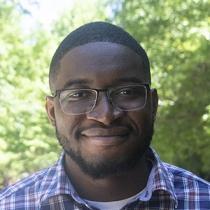
Olatunde Sanni
After you graduate, what is your next adventure?
Originally, I came to Tech to get my master's degree and go back to industry, but since I've been here, I've seen there's so much more I want to learn. I want to become an expert. So I will be continuing in the aerospace engineering Ph.D. program. This summer I will be taking two classes, but I will also be working with Professor [Brian] German and Professor [Eric ] Feron on an UAV design optimization project. I will be using open-source tools to develop models and algorithms for UAVs.
I will also be working with the Hines Family Foundation and the Georgia Space Grant Consortium on a STEM outreach project for elementary school students. We'll be using X-In-A-Box hardware and software and setting it up at the Atlanta International High School. Community outreach for STEM is important for someone like me, who grew up in Baltimore. I had the support of my community to get me here. With this project, I will be able to give back to grade school kids here - kids who may have a lot of questions about how it all works.
What about your next adventure are you most looking forward to?
I am excited about being able to focus on research - particularly in testing the models and algorithms in hardware-in-the-loop simulations. All of the theory I've learned in my courses is powerful, but I lean more toward being an experimentalist, so I am looking forward to applying that theory. My end goal is to be a chief technologist at a company that supports flying taxis or UAVs. I want to be involved in developing the algorithms that make it all work.
Did you have any previous co-op, internship, or research experience in this area?
As an undergraduate [at the University of Maryland] I did air speed measurements at the National Institute of Standards and Technology's [NIST] Fire Research Lab. I was there for more than a year, and I co-authored a paper. That was my first time doing research, and I'm still in touch with my boss today. The experience confirmed that I wanted to do experimental research. My interest was in hands-on learning.
Next, I was at NASA Ames in California, where I investigated the remaining useful life of power electronics, modeling when they were likely to fail. I was paired with a Ph.D. candidate at Ames, and what he impressed on me was, if you want to make the most out of grad school, go somewhere with the resources and the commitment to do big things. I saw that at Ames. I saw that my dreams could happen.
After that, I worked full-time as a RF applications engineer at National Instruments, in Austin, Texas. I helped set up tests for measuring different RF chips. What I realized from this was that it's great to support a project, but I wanted to be there at the beginning of a project, to define the next solution. That's when I decided it was time for me to go back to school where I could learn to lead.
At Tech, I've been involved in the Decision Control Lab, working on a UAV design optimization project that will be the basis for my dissertation.
How did your educational experience at Georgia Tech help you to achieve your goals?
There are so many influential people and experts who come here to serve as guest lecturers. It is a great way to network, to find out what's going on in the field. Tech also provides so many resources that have helped me to learn on my own - from the library, where I can learn using Lynda.com to my lab, where I can learn from the research I am doing with others. If I'm interested in anything, Tech gives me the resources I need to pursue it. And that includes just popping into a faculty's office to discuss something that was brought up in class or in the lab.
What advice would you give to an underclassman who would like to follow the same path?
I think the most important thing is to have a goal in mind when you start school here, and to then realize that so many things can take you away from it. You should remember that goal, every day, so that you can pursue it.
At the beginning of the semester, this is important because you will see so many classes and you might want to take all of them. But at the end of the semester, this will give you a lot of work.
Learn time management skills. Figure out a plan to succeed and follow it. Don't think you'll just handle things as they come, because you will want to do your best at everything and you will find that very difficult.